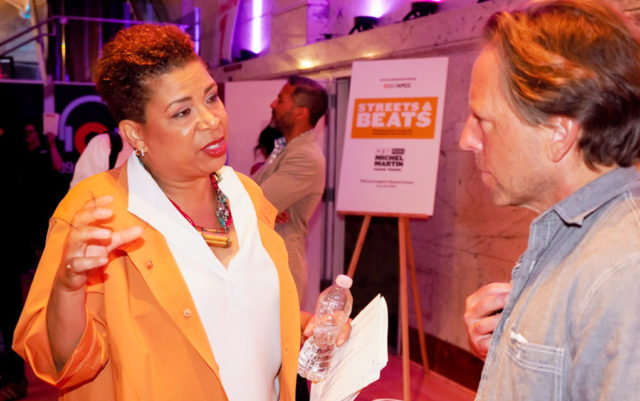
In the digital age, journalism can get lazy. With internet sources and phone interviews, Skype and file-sharing, investigating a story can be done from the office and home, across cities, states and continents.
While these tools have enabled an information boom unparalleled in history, one has to ask: What is being lost in the white noise?
Michel Martin, weekend host of National Public Radio’s (NPR) All Things Considered, knows it takes more than a news story to solve problems.
Her solution is Going There, an NPR program that takes national issues directly to the local communities most affected by them. Assembling a diverse panel of local Coloradans, “Going There: The Future of Water” will broadcast a live conversation on water rights, ethics and morals from Colorado State University’s Lory Student Center on May 24.
Martin and her team have assembled an uncommon panel for the event; people she believes wouldn’t normally be cited in the water conversation: a science fiction writer, a Native American rights activist who specializes in solar energy, a professor, an activist hailing from Flint, Michigan, and a rancher who formerly served in the Colorado Legislature are among them.
The result, Martin hopes, is a discussion of the water issue beyond the basic arguments already covered in the press, while adding a personal and creative element to an issue that is often discussed with facts and numbers alone.
Martin says the topic of water is perfectly suited for a discussion in Colorado, which has a long history of citizen battles over water and national significance as the source of much of the Southwest’s water supply.
“Water is so central to the issue of the development of the West, it just seems like a no-brainer,” Martin says. “How you use water, who gets to use water, where does the water come from, is so central to the West that you don’t even think about it sometimes. For a lot of people, water is just something that comes out of the tap.”
In addition to being the subject of a heated debate in Colorado, Martin says the mismanagement crisis in Flint, Michigan, and the ongoing drought in California have spurred national concern over the future of water across the U.S.
“Both in areas that are rural and white and sparsely populated and also in highly dense cities, water is an issue,” she says. “It’s in the news in ways that it has not been in decades. In my lifetime, we’ve never talked about water as much as we have [today].”
While conflicting claims of water rights have divided Coloradans back to the early settlers, tension over water rights between Front Range farmers and metropolitan areas has reached new heights in recent decades.
Colorado’s water problem is partially demographic: 80 percent of the population lives east of the Rocky Mountains, while almost 90 percent of the water flows westward, out of the state. The other side of the equation is a warming climate expected to reduce snowmelt.
With Colorado’s population estimated to double by 2050, Gov. John Hickenlooper ordered the state’s first water plan in 2014, which was finalized last year by the Colorado Water Conservation Board. The plan lacks regulatory authority and relies heavily on conservation.
The conservation plan brought the uncertainty of Colorado’s situation to the forefront of state discourse — briefly. Even so, Martin believes, state media coverage of the water issue may have done more to divide communities rather than engage with them.
“The whole point of [Going There] is to have it be an experience where you feel invigorated,” Martin says, “as opposed to the shouting tests that you hear on so many other platforms these days, where everybody walks away feeling defeated and disgusted.”
With something as important as water, Martin knows people can’t come away angry and divided. A devout believer in roundtable discussions, which have been at the core of her career at NPR, Martin aims to cut through the traditional media coverage the water issue has received, which often draws from the same sources and leaves many voices out of the conversation.
“Typically when you are trying to cover an issue, you would pick a committee chairman or a person with a title,” Martin says. “So my take on it [is], what if you invited people and not jobs to participate in the conversation?
“Maybe the sole of all wisdom is not contained in one person,” she adds. “Maybe one person doesn’t have the answer to everything. What’s the wisdom of the group? It’s like crowdsourcing ideas. And that just feels more fresh to me.”
On the Bill: NPR Presents: “Going There: The Future of Water.” 7 p.m. Tuesday, May 24, Colorado State University’s Lory Student Center, 1101 Center Ave. Mall, Fort Collins. Tickets at nprpresents.org, $15.














